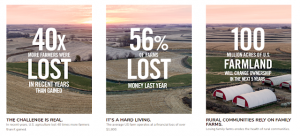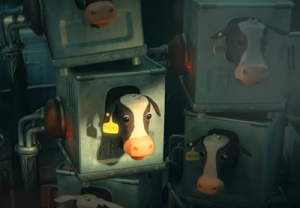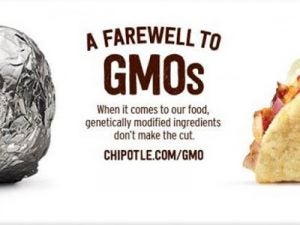After years of anti-farmer rhetoric, disgusting anti-agriculture videos, and trashing farmer seed choice, Chipotle now seems to have found a love for the American farmer that is as warm and inviting as the gooey core of a steak burrito. Their new “Cultivate the Future of Farming” campaign raises awareness of the hardships being experienced in agriculture, and then offers their thoughts and some seed grants in order to reverse it.
But are they solving a problem that they were instrumental in creating?
The crisis in agriculture is real, with farmers suffering from low prices, astronomical costs, and strangling regulation. Farmer suicides are a barometer of the crisis. Farms, from commodity crops to dairies, are going out of business daily. It is good to see a company raising awareness.

However, Chipotle’s new ag-vertisment is akin to pouring gas all over a dry forest, throwing in a match, and then a few years later wanting to be perceived as tree friendly by planting a few saplings.
The threats to farmers and the negative perception of agriculture are precisely the problems that Chipotle helped to create. Their 2014 video Farmed and Dangerous was a slam on large-scale animal agriculture, the industry that produces the very stuff that goes into the tortilla.

Farmed and Dangerous was not their first effort. The video short The Scarecrow depicted a sad, dystopian world of food production. They depict dairy production as forlorn cows locked in stacked metal boxes with milk being extracted by an extensive network of plumbing.

And of course, their penetrating campaign against genetic engineering played into the momentum of failed labeling efforts of the day, seeking to affect farmer seed choice by scaring customers away from perfectly safe ingredients. These campaigns also harmed farm perception by suggesting that American farm products were unsafe because of genetic engineering, a position known to be false.

All of these efforts targeting modern farming practices were designed to influence public perception, put pressure on agricultural producers, and force adoption of alternative practices. And they wonder why there is a crisis on the farm and in rural communities.
Let’s get real. Chipotle’s decisions to fight agriculture or embrace it are not borne from altruism. Public-facing corporate positions are spawned from focus groups and surveys, as a multinational, billion dollar food empire certainly has its greasy finger on the consumer’s pulse. Ad campaigns play into reinforcing the consumer’s perceptions and identity, showing that Big Burrito aligns with their values.
That is what you are seeing here. The public is becoming increasingly aware of the fragile state of agricultural production, and the crisis that has hit rural North America hard.
So is “Cultivate the Future of Farming” just an ag-washing ornament to exploit farmer hardship, or is this a genuine change of heart?
If it is indeed the latter it needs to start with an apology, and an honest one. Chipotle needs to boldly proclaim the error of their ways, atone for their anti-science positions, and their profound misrepresentation of agriculture. They need to own that at least a subset of those suicides might have been sadly seeded by sentiment reinforced by Farmed and Dangerous.
In the six years since Chipotle’s anti-farmer efforts hit a feverish pace, public perception has changed. The fear-based misinformation failed, and time has not treated such efforts well. Those videos are a shameful reminder of rhetoric of the time.
Imagine where we’d be today if in 2014 Chipotle and other brands invested heavily in research, rural mental health, or resources to bring precision agriculture to farmers. I think the perception of Chipotle and the perception of crop and animal production would be very different. And while it is good to see them flip positions, a bolder statement of the error of their ways would certainly tug at the logical circuits of consumers once bent on fearing food.
Maybe the best message is — don’t bite the hand that feeds in the first place, as targeting those that produce the products you sell makes your business not sustainable, and lays a foundation that can have profound, negative effects on a critical industry.
Kevin Folta is a land-grant scientist exploring ways to make better food with less input, and how to communicate science. This work reflects his private, personal opinions and may not represent the views his employer. This article was published on AGDAILY with his permission. All of Dr. Folta’s funding can be found at kevinfolta.com/transparency.



